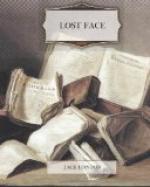The dog dropped in again at his heels, with a tail drooping discouragement, as the man swung along the creek-bed. The furrow of the old sled-trail was plainly visible, but a dozen inches of snow covered the marks of the last runners. In a month no man had come up or down that silent creek. The man held steadily on. He was not much given to thinking, and just then particularly he had nothing to think about save that he would eat lunch at the forks and that at six o’clock he would be in camp with the boys. There was nobody to talk to and, had there been, speech would have been impossible because of the ice-muzzle on his mouth. So he continued monotonously to chew tobacco and to increase the length of his amber beard.
Once in a while the thought reiterated itself that it was very cold and that he had never experienced such cold. As he walked along he rubbed his cheek-bones and nose with the back of his mittened hand. He did this automatically, now and again changing hands. But rub as he would, the instant he stopped his cheek-bones went numb, and the following instant the end of his nose went numb. He was sure to frost his cheeks; he knew that, and experienced a pang of regret that he had not devised a nose-strap of the sort Bud wore in cold snaps. Such a strap passed across the cheeks, as well, and saved them. But it didn’t matter much, after all. What were frosted cheeks? A bit painful, that was all; they were never serious.
Empty as the man’s mind was of thoughts, he was keenly observant, and he noticed the changes in the creek, the curves and bends and timber-jams, and always he sharply noted where he placed his feet. Once, coming around a bend, he shied abruptly, like a startled horse, curved away from the place where he had been walking, and retreated several paces back along the trail. The creek he knew was frozen clear to the bottom—no creek could contain water in that arctic winter—but he knew also that there were springs that bubbled out from the hillsides and ran along under the snow and on top the ice of the creek. He knew that the coldest snaps never froze these springs, and he knew likewise their danger. They were traps. They hid pools of water under the snow that might be three inches deep, or three feet. Sometimes a skin of ice half an inch thick covered them, and in turn was covered by the snow. Sometimes there were alternate layers of water and ice-skin, so that when one broke through he kept on breaking through for a while, sometimes wetting himself to the waist.
That was why he had shied in such panic. He had felt the give under his feet and heard the crackle of a snow-hidden ice-skin. And to get his feet wet in such a temperature meant trouble and danger. At the very least it meant delay, for he would be forced to stop and build a fire, and under its protection to bare his feet while he dried his socks and moccasins. He stood and studied the creek-bed and its banks, and decided that the flow of water came from the right. He reflected awhile, rubbing his nose and cheeks, then skirted to the left, stepping gingerly and testing the footing for each step. Once clear of the danger, he took a fresh chew of tobacco and swung along at his four-mile gait.




